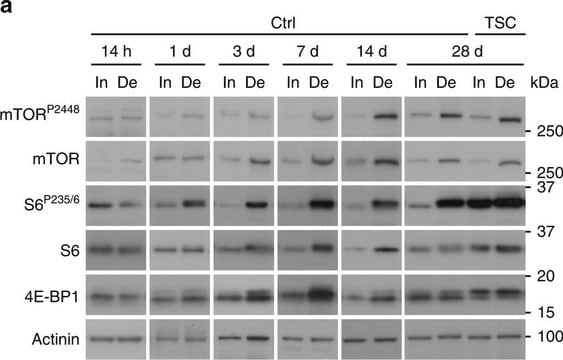05-384
Anti-α-Actinin Antibody, clone AT6/172
clone AT6/172, Upstate®, from mouse
Sinonimo/i:
Anti-BDPLT15
About This Item
Prodotti consigliati
Origine biologica
mouse
Livello qualitativo
Forma dell’anticorpo
purified immunoglobulin
Tipo di anticorpo
primary antibodies
Clone
AT6/172, monoclonal
Reattività contro le specie
rabbit, human, mouse
Produttore/marchio commerciale
Upstate®
tecniche
immunocytochemistry: suitable
western blot: suitable
Isotipo
IgG1
N° accesso NCBI
N° accesso UniProt
Condizioni di spedizione
dry ice
modifica post-traduzionali bersaglio
unmodified
Informazioni sul gene
human ... ACTN1(87)
Specificità
Immunogeno
Applicazioni
Cell Structure
Cytoskeleton
Qualità
Descrizione del bersaglio
Stato fisico
Stoccaggio e stabilità
Risultati analitici
Positive Antigen Control: Catalog #12-301, non-stimulated A431 cell lysate. Add 2.5µL of 2-mercaptoethanol/100µL of lysate and boil for 5 minutes to reduce the preparation. Load 20µg of reduced lysate per lane for minigels.
Note legali
Esclusione di responsabilità
Non trovi il prodotto giusto?
Prova il nostro Motore di ricerca dei prodotti.
Codice della classe di stoccaggio
12 - Non Combustible Liquids
Classe di pericolosità dell'acqua (WGK)
WGK 2
Punto d’infiammabilità (°F)
Not applicable
Punto d’infiammabilità (°C)
Not applicable
Certificati d'analisi (COA)
Cerca il Certificati d'analisi (COA) digitando il numero di lotto/batch corrispondente. I numeri di lotto o di batch sono stampati sull'etichetta dei prodotti dopo la parola ‘Lotto’ o ‘Batch’.
Possiedi già questo prodotto?
I documenti relativi ai prodotti acquistati recentemente sono disponibili nell’Archivio dei documenti.
Il team dei nostri ricercatori vanta grande esperienza in tutte le aree della ricerca quali Life Science, scienza dei materiali, sintesi chimica, cromatografia, discipline analitiche, ecc..
Contatta l'Assistenza Tecnica.






![E-64 N-[N-(L-3-Trans-carboxirane-2-carbonyl)-L-leucyl]-agmatine](/deepweb/assets/sigmaaldrich/product/structures/168/240/c77e3f6a-6709-4d17-b774-b850e8a54a51/640/c77e3f6a-6709-4d17-b774-b850e8a54a51.png)